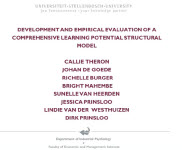Die voorspelling van studentesukses: watter faktore behoort ons in ag te neem?
Auxin Padkossessie – 31 Julie 2012
Watter faktore speel ’n rol in die sukses wat studente behaal? Hoe meet ons hierdie veranderlikes? En hoe gebruik ons hierdie kennis om die ontwikkeling van studente te ondersteun? Hierdie is vrae wat gevra is tydens ’n sessie, getiteld “Die voorspelling van studentesukses: watter faktore behoort ons in ag te neem?”, wat onlangs aangebied is as deel van die Auxin-projek. Die projek het ten doel om geleenthede vir akademiese personeel van die US te skep om voortdurend hulle onderrigvaardighede deur hulle bloot te stel aan gesprekke met kundiges en ander akademici op kampus.
Tydens die sessie het twee sprekers opgetree – prof Callie Theron (Bedryfsielkunde) en dr Alten du Plessis (Tredhou). Die aanbieders het die kompleksiteit van die verklaring en voorspelling van studentesukses beklemtoon deur verskillende perspektiewe en metodes in te span om die vraag te belig. In die meegaande potgooie (“podcasts”) kan u beide se aanbiedings sien sowel as van die gesprek wat deur die aanbiedinge gestimuleer is. Lewer gerus kommentaar indien u wil deelneem aan die gesprek!
Prof Callie Theron: Development and empirical evaluation of a comprehensive learning potential structural model (20 minutes, mp4, 32mb)
Dr Alten du Plessis: Mining wellness and performance data to identify at-risk First-Year engineering students (19 minutes, mp4, 47mb)
Participants and presenters: Podcast of the discussion (17 minutes, mp3, 12mb)


